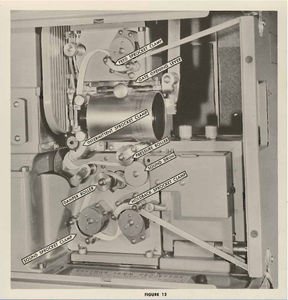| Welcome to Sprocket School! This project is maintained by volunteer editors. Learn more about how this works. |
Eastman 25: Difference between revisions
Jump to navigation
Jump to search
No edit summary |
No edit summary |
||
| Line 1: | Line 1: | ||
According to James Bond of [http://www.fullaperturesystems.com Full Aperture Systems], the differences between Eastman models 25, 25 B, 25 C, 30, and 40 are primarily cosmetic. Mechanically, they are very similar. The Model 30 was originally intended for use with tungsten lamps and the Model 40 for use with xenon lamps. | According to James Bond of [http://www.fullaperturesystems.com Full Aperture Systems], the differences between Eastman models 25, 25 B, 25 C, 30, and 40 are primarily cosmetic. Mechanically, they are very similar. The Model 30 was originally intended for use with tungsten lamps and the Model 40 for use with xenon lamps. | ||
==Images== | |||
<gallery widths=300px heights=300px> | |||
File:Kinoton-lamphouse-eastman.jpg | |||
File:16mm-eastman.jpg | |||
File:16mm-eastman-2.jpg | |||
File:16mm-eastman-1.jpg | |||
</gallery> | |||
==Threading== | ==Threading== | ||
Revision as of 19:19, 12 August 2013
According to James Bond of Full Aperture Systems, the differences between Eastman models 25, 25 B, 25 C, 30, and 40 are primarily cosmetic. Mechanically, they are very similar. The Model 30 was originally intended for use with tungsten lamps and the Model 40 for use with xenon lamps.
Images
Threading
-
Image from the Eastman 25 manual.
-
Booths using this projector
- Doc Films at the University of Chicago, Chicago, IL
- Gene Siskel Film Center, Chicago, IL - in Theater 1
- Museum of Contemporary Art, Chicago, IL
- Music Box Theatre, Chicago, IL
- School of the Art Institute of Chicago, Department of Film, Video, New Media, and Animation screening rooms




